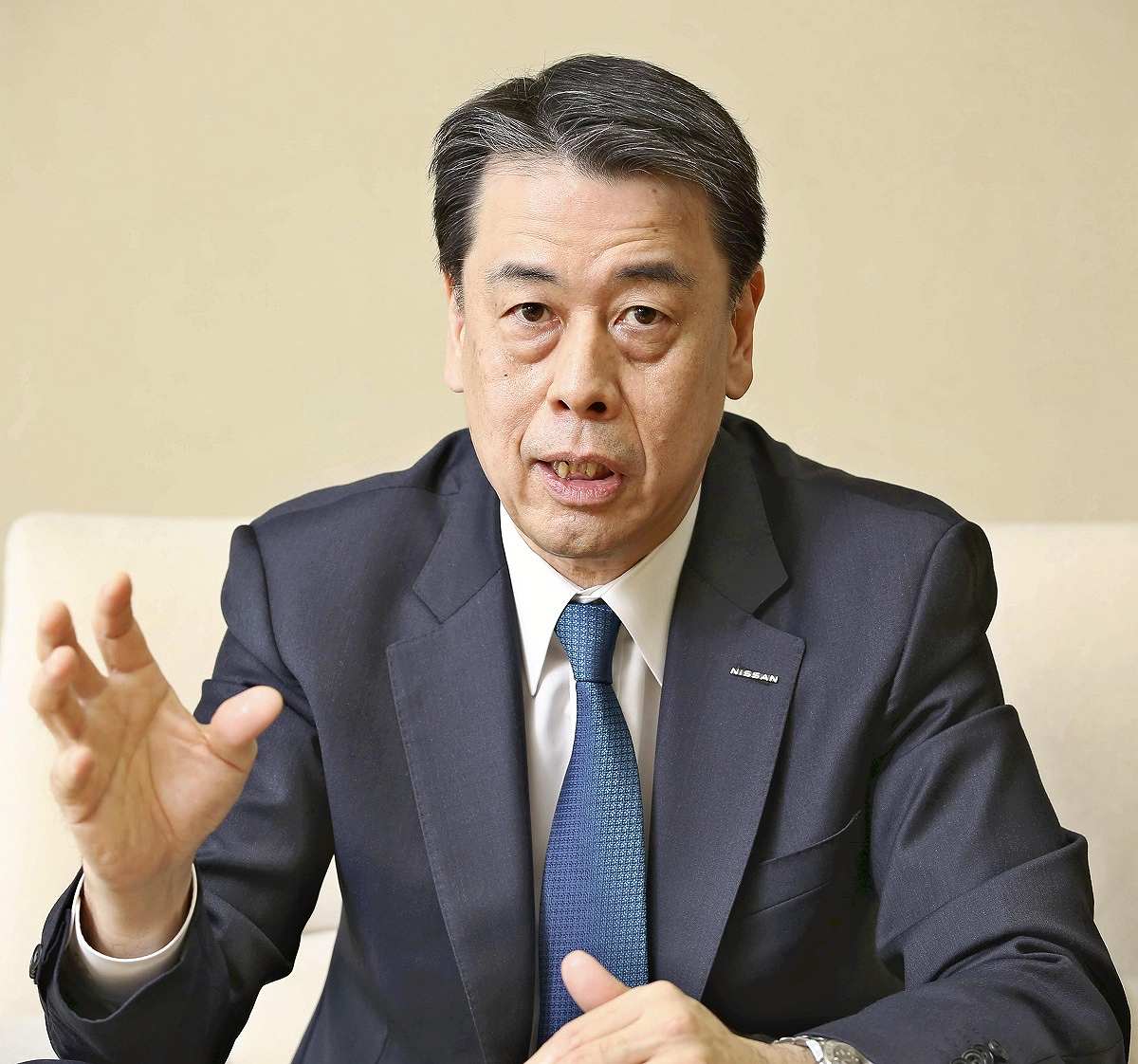
The logo of Nissan Motor Corp. is displayed the company’s showroom in Tokyo on Nov. 11.
18:41 JST, December 15, 2020
One year has passed since Makoto Uchida, 54, became Nissan Motor Co.’s president and chief executive officer. Nissan is currently reviewing its business structure, moving away from former Chairman Carlos Ghosn’s expansionist policy. However, a full-fledged recovery in the company’s earnings is not yet on the horizon, and Nissan will be tested as to whether it can continue its painful reforms.
■ Post-Ghosn era
Uchida took office on Dec. 1, 2019, with his most urgent task the rebuilding of Nissan’s financial base, which had been damaged in the Ghosn era. Nissan’s earnings fell sharply after excessive price cuts in North America degraded its brand image, sending the company into a vicious cycle of shrinking funds for development and the delayed introduction of new models. In the fiscal year ended March 2020, shortly after Uchida took over, Nissan posted a consolidated net loss of ¥671.2 billion.
“We will achieve steady growth without unduly increasing sales volume,” Uchida said, reducing the sales incentives that were a source of discounts. As a result, the price per vehicle rose by 1.5%. Nissan reviewed sales for rent-a-car use, which has a low profit margin, and also decided to drastically reduce inventory and close plants in Indonesia and Spain.
“We see some prospects of stopping the current bleeding, and some light in the once-dark future,” a Nissan executive said.
■ Consecutive losses
Starting this year, Nissan will release a total of 12 new models around the world, spurred by Uchida’s philosophy that momentum is necessary to avoid diminishing equilibrium.
Nissan released the Kicks small sports-utility vehicle in June this year and is scheduled to launch the Note compact car later this month. However, the launch of the Ariya electric vehicle and Fairlady Z sportscar are yet to come. The novel coronavirus has spread again in Japan, Europe and North America, and sales are feared to drop more than envisioned.
The automaker expects to post a net loss of ¥615 billion in the year to March 2021, taking into account the costs of advertising new vehicles. Nissan’s situation is in sharp contrast to Toyota Motor Corp. and Honda Motor Co., which are making a profit on strong sales in China. Nissan has no choice but to continue cutting fixed costs and other expenses.
■ Working with Renault, Mitsubishi
Collaborating with Renault SA and Mitsubishi Motors Corp., with which Nissan has a business alliance, will also be a challenge.
In May, the three companies announced new strategies to strengthen their alliance. They plan to divide their roles by region and technology, to cut investment in each model by up to 40%. The details need to be discussed as soon as possible.
Countries around the world are launching tighter environmental regulations for automobiles, and Japan is considering having all new vehicles be hybrid vehicles, EVs and fuel cell vehicles from the mid-2030s. Competition to develop such cars is expected to intensify, and Nissan is facing a crucial stage in its survival.
■ INTERVIEW

Nissan Motor Co. President and Chief Executive Officer Makoto Uchida speaks to The Yomiuri Shimbun.
Nissan’s Uchida : Electrification is key for survival
The following is an excerpt from an interview with Nissan Motor Co. President Makoto Uchida by The Yomiuri Shimbun.
Until now, Nissan had been excessively tracking sales numbers. Our biggest problem was that we couldn’t adapt to the changing needs of our customers from various regions.
The side effects [of the expansionist policy led by former Chairman Carlos Ghosn era] were bigger than I expected, and I couldn’t change the situation within a year after taking office. In the year ending March 2021, we still project a net loss of ¥615 billion. I presented this figure given that we cannot be optimistic amid the coronavirus crisis and because I also wanted to avoid a downward revision of our earnings forecast at all costs.
At the same time, we will make investments necessary for growth while strengthening our financial base through restructuring. We want to show the value of Nissan and “Nissan’s personality” through new cars. We’ve set a goal to make a solid profit from sales of new vehicles and go into the black in the year ending March 2022.
[The government’s plan] that all new vehicles sold must be electric by the mid-2030s is tough. However, as countries around the world have expressed their intention to tighten environmental regulations, Nissan’s main strategy is to shift to EVs. We need to focus on the development of a power train.
We are also compiling a long-term plan envisioning the kind of company we want to be around 2030. We want to show how we can increase our corporate value in other ways than selling cars, for example, by utilizing EV batteries in times of disaster.
The alliance with Renault and Mitsubishi Motors is an irreplaceable asset, and we’ll do all we can to strengthen it. We are said to be slow [in producing results], and the leaders of the three companies are discussing details now. We want to take advantage of our combined size in the field of storage batteries.
Top Articles in Business
-

Prudential Life Insurance Plans to Fully Compensate for Damages Caused by Fraudulent Actions Without Waiting for Third-Party Committee Review
-

Narita Airport, Startup in Japan Demonstrate Machine to Compress Clothes for Tourists to Prevent People from Abandoning Suitcases
-

Asics Opens Factory for Onitsuka Tiger Brand in Western Japan
-

JR Tokai, Shizuoka Pref. Agree on Water Resources for Maglev Train Construction
-

KDDI Opens AI Data Center at Former Sharp Plant in Osaka Prefecture; Facility Will Provide Google’s Gemini AI Model for Domestic Users
JN ACCESS RANKING
-

Japan Institute to Use Domestic Commercial Optical Lattice Clock to Set Japan Standard Time
-

Israeli Ambassador to Japan Speaks about Japan’s Role in the Reconstruction of Gaza
-

Man Infected with Measles May Have Come in Contact with Many People in Tokyo, Went to Store, Restaurant Around When Symptoms Emerged
-

China Eyes Rare Earth Foothold in Malaysia to Maintain Dominance, Counter Japan, U.S.
-

Prudential Life Insurance Plans to Fully Compensate for Damages Caused by Fraudulent Actions Without Waiting for Third-Party Committee Review























